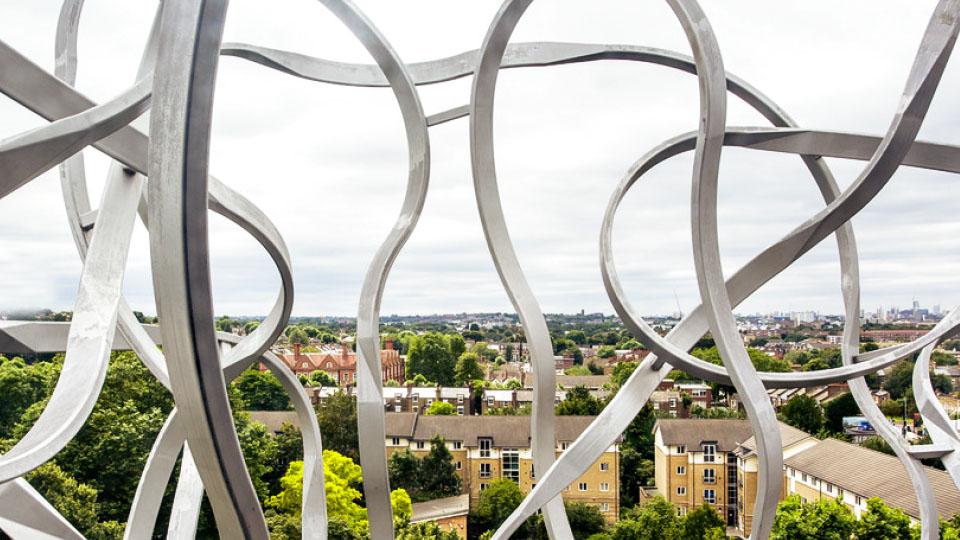Originally posted by doversoul1
View Post
Moral Maze - British Places : Better Represented By Classical Music Than Other Forms
Collapse
X
-
Songs are surely different? It's just the words of Waterloo Sunset (I had to remind myself what it sounded like) that have anything to do with 'place'. Classical works without words can't evoke specific places. The titles are simply acknowledging an environment which inspired the composer, rather than an attempt at a recognisable evocation, aren't they?
The Yorkshire duo. Scarborough Fair, the folk song, seems to have had a geographically diverse history and development - very little of which has to do with Scarborough, N. Yorkshire.Originally posted by doversoul1 View PostYes! Simon & Garfunkel
 It isn't given us to know those rare moments when people are wide open and the lightest touch can wither or heal. A moment too late and we can never reach them any more in this world.
It isn't given us to know those rare moments when people are wide open and the lightest touch can wither or heal. A moment too late and we can never reach them any more in this world.
Comment
-
-
AbsolutelyOriginally posted by french frank View PostSongs are surely different?
Words words words words words
If you want music that includes a sense of sonic provenance then I would go for more soundart, electroacoustic or field recording approaches.
Or even this ?
Last edited by MrGongGong; 14-08-17, 13:59.
Comment
-
-
.
... I suppose 'place' can sometimes be identified organologically - if we hear Northumbrian pipes, Spanish clarin real organ stops, the shakuhachi, a Taskin harpsichord - there is then an ability to 'locate' a piece geographically.
But geography seems to me a pretty trivial distraction in the enjoyment and understanding of music ...
Comment
-
-
Surely not a distraction in folk music, which is often strongly rooted in place , reflected in both musical idiom, and lyrical content ?Originally posted by vinteuil View Post.
... I suppose 'place' can sometimes be identified organologically - if we hear Northumbrian pipes, Spanish clarin real organ stops, the shakuhachi, a Taskin harpsichord - there is then an ability to 'locate' a piece geographically.
But geography seems to me a pretty trivial distraction in the enjoyment and understanding of music ...
More the point of it, rather than a distraction ?
Does an understanding of the geographical location of Czech folk idioms not add to the understanding and enjoyment of Dvorak ?I will not be pushed, filed, stamped, indexed, briefed, debriefed or numbered. My life is my own.
I am not a number, I am a free man.
Comment
-
-
 Richard Tarleton
Richard Tarleton
HmmmmOriginally posted by doversoul1 View PostTo the revised thread title:
Elizabethan lute music. Very quaint and English. - Elizabeth's England was home to some of the best executants and composers
- Elizabeth's England was home to some of the best executants and composers  - but many of the forms in which they wrote tended to be pan-European (pavans, almains, galliards)....experts may be able to identify national styles, certainly, but I don't think the music itself conveys a sense of place (is that what we're talking about?). Some musicians never left these shores (John Johnson) but others moved around pretty freely, as long as there wasn't a war on - Dowland, Ferrabosco the elder (a leading light at Elizabeth's court)....
- but many of the forms in which they wrote tended to be pan-European (pavans, almains, galliards)....experts may be able to identify national styles, certainly, but I don't think the music itself conveys a sense of place (is that what we're talking about?). Some musicians never left these shores (John Johnson) but others moved around pretty freely, as long as there wasn't a war on - Dowland, Ferrabosco the elder (a leading light at Elizabeth's court)....
This topic doesn't do a great deal for me either - strip out the words, the titles, and non-musical cultural baggage, and you're left with....music.
Comment
-
But why would you want to do that, if the composer thought it significant enough to include ?Originally posted by Richard Tarleton View PostHmmmm - Elizabeth's England was home to some of the best executants and composers
- Elizabeth's England was home to some of the best executants and composers  - but many of the forms in which they wrote tended to be pan-European (pavans, almains, galliards)....experts may be able to identify national styles, certainly, but I don't think the music itself conveys a sense of place (is that what we're talking about?). Some musicians never left these shores (John Johnson) but others moved around pretty freely, as long as there wasn't a war on - Dowland, Ferrabosco the elder (a leading light at Elizabeth's court)....
- but many of the forms in which they wrote tended to be pan-European (pavans, almains, galliards)....experts may be able to identify national styles, certainly, but I don't think the music itself conveys a sense of place (is that what we're talking about?). Some musicians never left these shores (John Johnson) but others moved around pretty freely, as long as there wasn't a war on - Dowland, Ferrabosco the elder (a leading light at Elizabeth's court)....
This topic doesn't do a great deal for me either - strip out the words, the titles, and non-musical cultural baggage, and you're left with....music.I will not be pushed, filed, stamped, indexed, briefed, debriefed or numbered. My life is my own.
I am not a number, I am a free man.
Comment
-
-
 Richard Tarleton
Richard Tarleton
I thought (if I understood the OP correctly) we were discussing whether music, on its own, can convey a sense of place? I was merely arguing that without the non-musical clues, it can't - unless as I said in my earlier post it includes native folk tunes or rhythms (I mentioned Spain and Hungary, but your Dvorak a good case in point).Originally posted by teamsaint View PostBut why would you want to do that, if the composer thought it significant enough to include ?
It's one thing for locus to have inspired the composer, quite another for the music, on its own, to tell us where it represents.
Comment
-
That's understanding "place" rather generously, dovers! Is there anything particularly Elizabethan Mancunian, or Durhamesque about the Music? (And is there a nationalistic difference between the Music Dowland wrote in England and that he wrote in Denmark?)Originally posted by doversoul1 View PostElizabethan lute music. Very quaint and English.
There's also, Delius - born in Bradford to German parents, lived in Florida and Norway before settling in France, where he wrote a work called Paris! (Mind you, I was baffled by Fritz/Fred's larger-scale structures for years - having lived with the Bradford weather for over twenty years, it all now makes perfect sense.)Last edited by ferneyhoughgeliebte; 14-08-17, 13:58.[FONT=Comic Sans MS][I][B]Numquam Satis![/B][/I][/FONT]
Comment
-
-
Yes, I agree that the connections are there by association rather than anything ( usually ) intrinsic. But I'm not sure I can remove those associations, once there.Originally posted by Richard Tarleton View PostI thought (if I understood the OP correctly) we were discussing whether music, on its own, can convey a sense of place? I was merely arguing that without the non-musical clues, it can't - unless as I said in my earlier post it includes native folk tunes or rhythms (I mentioned Spain and Hungary, but your Dvorak a good case in point).
It's one thing for locus to have inspired the composer, quite another for the music, on its own, to tell us where it represents.
As Vinny says, pipes, for example, place music by association, but the kind of music which they tend to produce can then be representative of place.
If one accepts that, then you can take it further. So the pipes example, can be extended to the music of Stuart Adamson, who presented( created) a guitar sound which incorporated some elements of pipe sounds, and which thus, secondhand or by association perhaps, places his music geographically. I think you could listen to his sound, and confidentally place him as Scottish, without any lyric or other clue.I will not be pushed, filed, stamped, indexed, briefed, debriefed or numbered. My life is my own.
I am not a number, I am a free man.
Comment
-
-
 Richard Tarleton
Richard Tarleton
No, as you hintOriginally posted by ferneyhoughgeliebte View PostThat's taking "place" rather generously, dovers! Is there anything particularly Elizabethan Mancunian, or Durhamesque about the Music? (And is there a nationalistic difference between the Music Dowland wrote in England and that he wrote in Denmark?) . Once you start to unpick the various influences and cross-fertilisations, as Diana Poulton does, it all ends up as pretty pan-European. The King of Denmark's Galliard (a pan-European renaissance dance form) was a re-working of Dowland's own Batell Galliard, which belongs to of a group of pieces popular throughout Europe based around (the Frenchman) Jannequin's La Bataille which commemorated the (Italian) Battle of Marignano in 1515.....
. Once you start to unpick the various influences and cross-fertilisations, as Diana Poulton does, it all ends up as pretty pan-European. The King of Denmark's Galliard (a pan-European renaissance dance form) was a re-working of Dowland's own Batell Galliard, which belongs to of a group of pieces popular throughout Europe based around (the Frenchman) Jannequin's La Bataille which commemorated the (Italian) Battle of Marignano in 1515.....
Comment
-
... and of course the Battle of Marignano, altho' it took place in 'Italy', was actually a battle between the French (with the 'German' landsknechts) and the Old Swiss Confederacy. (The French won, by the way ... )Originally posted by Richard Tarleton View Post... The King of Denmark's Galliard (a pan-European renaissance dance form) was a re-working of Dowland's own Batell Galliard, which belongs to of a group of pieces popular throughout Europe based around (the Frenchman) Jannequin's La Bataille which commemorated the (Italian) Battle of Marignano in 1515.....
.
Comment
-
-
 Richard Tarleton
Richard Tarleton -
If you really want to get into this stuff about place, sound and significance
there's plenty of things to read here
Peter Cusak has been collecting Sounds from Dangerous Places http://sounds-from-dangerous-places.org
And John Drever has done much thinking about Soundmarks and the like
and so on and so on
In my experienece these folks have thought much more deeply about the subject than those in the Classial Music world who seem rather limited IMV
Comment
-




Comment